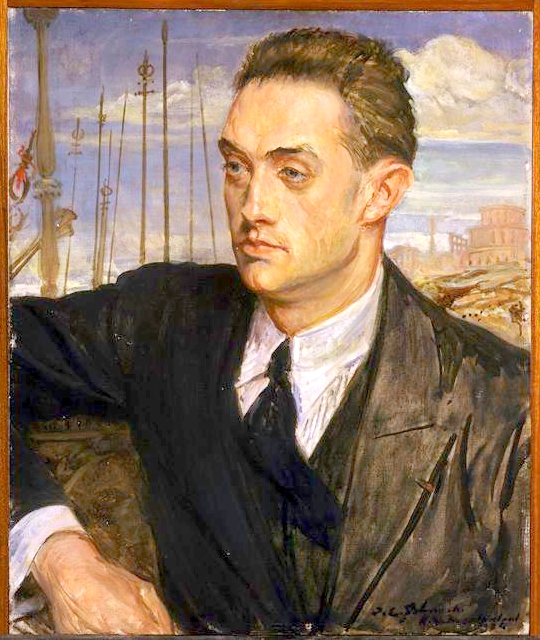

Queer Places:
Institution Notre Dame De Sainte Croix, 30 Avenue du Roule, 92200 Neuilly-sur-Seine, France
 Henry
Marie Joseph Frédéric Expedite Millon de Montherlant (20 April 1895 – 21
September 1972) was a French essayist, novelist, and dramatist.[1]
He was elected to the Académie française in 1960.
Henry
Marie Joseph Frédéric Expedite Millon de Montherlant (20 April 1895 – 21
September 1972) was a French essayist, novelist, and dramatist.[1]
He was elected to the Académie française in 1960.
Born in Paris, a descendant of an aristocratic (yet obscure) Picard family, he was educated at the Lycée Janson de Sailly and the Sainte-Croix boarding school at Neuilly-sur-Seine. Henry's father was a hard-line reactionary (to the extent of despising the post-Dreyfus Affair army as too subservient to the Republic, and refusing to have electricity or the telephone installed in his house).
In 1912 Henry was expelled from the Catholic Sainte-Croix de Neuilly academy for a relationship with a fellow male student, a relationship that he would depict in his 1969 novel Les Garçons. After the deaths of his father and mother in 1914 and 1915, he went to live with his doting grandmother and eccentric uncles.[2]
Mobilised in 1916, he was wounded and decorated. Marked by his experience of war, he wrote Songe ('Dream'), an autobiographic novel, as well as his Chant funèbre pour les morts de Verdun (Funeral Chant for the Dead at Verdun), both exaltations of heroism during the Great War.
De Montherlant first achieved critical success with the 1934 novel Les Célibataires, and sold millions of copies of his tetralogy Les Jeunes Filles, written from 1936 through 1939. In these years de Montherlant traveled extensively, mainly to Spain, Italy, and Algeria. During the Second World War after the fall of France in 1940 he remained in Paris and continued to write plays, poems, essays, and worked as a war correspondent.
During the post-WWII period, the French theatre was dominated by Jean Cocteau's circle, including the stage designer Christian Bérard and the actor Jean Marais; the bisexual Gérard Philipe was everyone's favorite leading man. The foremost members of the Comedic Francaise, such as Jean Weber and Jacques Charon, were familiar faces at gay salons. Julien Green's monumental Sud (South, 1953) clothed his doomed love story in Civil War garb and veiled suggestion; the agony of unrequited affection went even deeper in Henry de Montherlant's La Ville dont le Prince en un Enfant (The City Whose Prince Is a Child, 1951), set in a Catholic school where an obsessive priest roots out the special friendships of the students. Typically, the secretive and suicidal Montherlant considered it unsuitable for public performance by boys.
Some time in 1968, according to one source, de Montherlant was attacked and beaten in the streets of Paris, seriously injured and blinded in one eye.[2] The British writer Peter Quennell, who edited a collection of translations of his works, recalled that de Montherlant attributed the eye injury to "a fall" instead; and mentions in confirmation that de Montherlant suffered from vertigo.[3] After becoming almost blind in his last years, de Montherlant died from a self-inflicted[4] gunshot wound to the head after swallowing a cyanide capsule in 1972.
His standard biography was written by Pierre Sipriot, and published in two volumes (1982 and 1990), revealing the full extent of de Montherlant's sexual habits.
Although not openly gay, de Montherlant treated homosexual themes in his work, including his play La Ville dont le prince est un enfant (1952) and novel Les Garçons (The Boys), published in 1969 but written four or five decades earlier. He maintained a private correspondence with Roger Peyrefitte—author of Les Amitiés particulières (Special Friendships, 1943), also about relationships between boys at a Roman Catholic boarding school.
My published books: